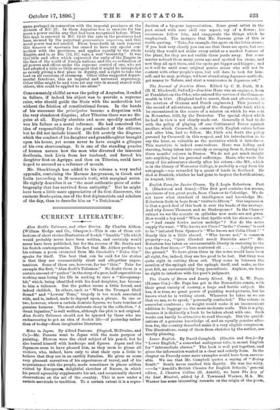English Verse for Junior Classes. By J. Logie Robertson. Part
I. (Blackwood and Sons.)—This first part contains ten poems, specimens of ten great poets, from Chaucer to Coleridge. We do not know what standard of intelligence and knowledge Mr. Robertson finds in boys from" twelve to fifteen." Our impression is that a good deal of this book is over the heads of the average. And why James Thomson and no Shakespeare ? In the Chaucer- extract we see the accents on syllables now mute are not given. How would a boy read "When that Aprille with his shoures sote," or "And smale fowles ma.ken melodye " ? Nor do the notes supply the want. "Who knows not Circe ? "in the" Comas," is saia to be "imitated from Spenser's 'Who knows not Colin Clout ? ' " Surely this is a little absurd. "Who knows not," is common property—e.g., " Quis illaudati nescit Busiridis eras?" Mr. Robertson has taken an unwarrantable liberty in restoring to the-
text the four lines,—" There scattered oft lightly press the ground." To have given them in the notes would have been all right, for, indeed, they are too good to be lost. But Gray was quite right in cutting them out. They come in between the mention of the epitaph and the epitaph itself, and make, as the- poet felt, an unwarrantably long parenthesis. Anyhow, we have no right to interfere with the poet's judgment.






































 Previous page
Previous page